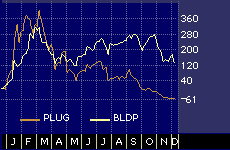
Power Play: Fuel-Cell Stocks
Power Play: Fuel-Cell Stocks
By Hal Plotkin
CNBC.com Silicon Valley Correspondent
Dec 18, 2000 07:30 AM
How much would you be willing to pay to keep the lights on?
If the answer is “more than I’m paying right now,” you might want to take a look at fuel-cell stocks. A number of industry analysts say the looming shortage of electricity is likely to create a big upside for investors smart enough to pick the right fuel-cell horse.
Fuel cells use a chemical, rather than mechanical, process to create electricity. The technology taps the energy stored in hydrogen, which can be extracted from a number of different fuels, including gasoline and methanol. Demonstration stand-alone fuel-cell units are already powering some small communities, universities, rural utilities and industrial parks. As demand for electricity increases, the units feed themselves more fuel and pump out more electricity. Maintenance requirements, other than the addition of fuel when needed, are said to be minimal. The biggest advantage, however, may be the fact that fuel cells offer the promise of reliable supplies of electricity that protect businesses from potentially costly power interruptions.
The technology is arriving on the scene at a critical moment in time.

52-Week Stock-Performance of Plug Power & Ballard Systems
Business and residential users of electrical power are facing a classic supply and demand imbalance created by too many users drawing too much juice from an electrical grid with limited power generation and transmission capacities. The problem is particularly acute in California, where utility customers have been warned to expect roving blackouts three times over the past two weeks. It is a trend state officials say is likely to worsen over the foreseeable future.
Despite a recent pullback in most of their share prices, the looming electricity shortage is very good news for fuel-cell companies. Although a number of government programs have been enacted in recent years to encourage the development of the alternative energy industry, most experts agree that market forces will be a more-effective driver going forward.
Analysts say the biggest beneficiary over the near term could be FuelCell Energy Inc. {FCEL}, which reiterated earlier this month that it is on track to begin accepting orders sometime next year that will enable individual large corporate and industrial users of electricity to buy and operate their own cost-effective power plants.
There have been a number of conspicuous disappointments in the nascent fuel-cell industry recently, most notably Plug Power Inc.’s {PLUG} announcement that it would push back commercialization of its technology, which is aimed at residential users, by at least a year. The August news led to the immediate resignation and replacement of the company’s chief executive officer and president.
That was followed by last month’s announcement that California’s Air Resources Board had agreed to relax a requirement that would have given the automotive fuel-cell industry a boost. Instead, California’s smog busters now say they will accept hybrid auto technologies, which use a combination of gas-powered internal combustion and batteries, in place of some of the fuel cell-powered cars it had previously mandated.
The double dose of bad news coupled with fears over the possible negative impact of a George W. Bush presidency has taken down most of the stocks in the sector. Analysts say the selling probably made sense for fuel-cell firms tied to the slow-to-develop automotive and residential markets, such as Plug Power and Ballard Power Systems Inc., {BLDP} the latter of which has deals with two major auto makers.

52-Week Stock-Performance of FuelCell Energy
At the same time, though, they say the downturn has created a nice entry point to get into FuelCell Energy’s stock, which many say will be the industry’s first big winner.
“FuelCell Energy is my top pick in the space,” says Maureen Murphy, energy analyst at Lehman Brothers based in New York. “I feel very confident in their ability to get it done. They have a consistent record of under-promising and over-delivering.”
Murphy currently has a “buy” rating on FuelCell Energy’s stock, her firm’s highest recommendation, along with a $124 12-month price target.
On Dec. 13, FuelCell Energy reported a loss of 32 cents a share for the fiscal year ended Oct. 31, 17 cents less than analysts had been expecting, according to First Call Corp.
But analysts say the company’s lower-than-expected losses, while positive, are less meaningful than the progress the company is making with test and demonstration units in development and those already deployed. A demonstration unit in Danbury, Conn., for example, operated for 16 months and almost 12,000 hours before it was taken off-line for post-test analysis earlier this year. A similar successful field test at the University of Bielefeld in Germany was also recently concluded. FuelCell Energy also won contracts this year totaling nearly $20 million from the U.S. Navy and the Department of Energy, both of which are aimed at proving the validity of the firm’s approach.
Analysts say FuelCell Energy’s technology, called “carbonate fuel cells,” appears to have several critical performance advantages over competing approaches. The most important is the greater amount of heat generated by the process, which can be used to drive electricity-producing turbines or for other purposes, such as heating and air-conditioning.
“When you join FuelCell Energy’s fuel cell with a turbine, you can produce electricity cheaper than what you’ll be able to buy off the grid,” says Brooke Glenn, a fuel-cell analyst at Jefferies & Co. in New York.
Glenn also has a “buy” rating on FuelCell Energy’s stock, along with a $200 12-to-18 month price target. She says the company is smart to concentrate on serving the industrial and commercial markets that are expected to be the first to mature, as opposed to automotive and residential.
“FuelCell Energy is going after a larger market, and they are one of the few players there, while the other firms face potentially stiff competition in smaller markets,” Glenn adds.
Worries about the potential impact of the pending change in the federal administration have also put something of a damper on fuel-cell stocks over the past month or so. Some observers felt that a Gore administration might have been more sympathetic to the alternative-energy industry.
But others say a Bush administration, with its emphasis on energy deregulation, will be exactly what the fuel-cell firms need.
“It’s those higher prices that will wake people up and get them to see there is a better way,” says Hugh Holman, an analyst with CIBC World Markets Corp. in Washington. “We’ll see some very healthy responses when we start to get real, deregulated pricing of electricity. Next year is going to be very exciting.”
Holman currently has a “buy” rating on FuelCell Energy’s stock, though he doesn’t have a price target.
Murphy agrees about the positive, or at least neutral, impact of the new federal administration on fuel-cell prospects.
She says that the energy policy outlined during the presidential campaign by President-elect Bush bodes well for fuel-cell stocks, given his stated desire to wean the United States from its dependence on foreign oil supplies.
“Given the closeness of the election, George Bush is not going to want to alienate the Green vote, particularly in places like Oregon, if he seeks reelection,” Murphy says.
Murphy adds that the identity of the president is far less important than what is going on in the supply-constrained electricity market. Nonetheless, she notes that within two weeks of the election, FuelCell Energy’s stock had fallen about 55% from its all-time high.
“The market anticipated a Bush victory and punished the [fuel-cell] stocks as a result,” Murphy says. “We believe the reaction was overdone. It creates one of the best buying opportunities we’ve seen.”


